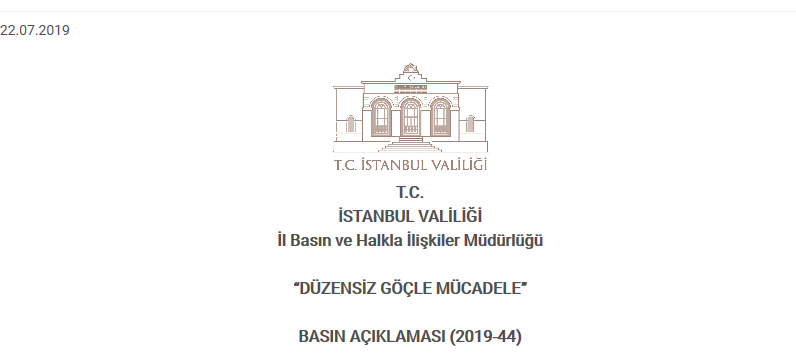
Anti-migrant Political Climate in Turkey Triggers Deportation of Syrian Nationals
Since July 12th, Turkish authorities have begun a crackdown on migrants living in Istanbul, following statements from President Recep Tayyip Erdoğan on new deportation policies targeting Syrians refugees accused of committing crimes. The policy has transformed into the removal of all unregistered Syrian nationals from Istanbul, and has led to the forced deportation of some refugees back to Syria.
Syrian migrants’ status in Turkey
Since the start of the Syrian conflict, Turkey has received the largest number of Syrian refugees, with 3.6 million Syrians registered in the country, and 547,479 Syrians registered under temporary protection status. Of the three legal protections provided to migrants in Turkey – refugee status, tourist residency, and temporary protection – the temporary protection allows migrants to legally work. When receiving temporary protection, recipients receive a document called “kimlik.” This document states which governorate in Turkey granted the temporary protection status, and allows the recipient to legally work. However, Istanbul and other governorates in Turkey stopped issuing legal status to asylum seekers between 2017 and 2018, meaning Syrians who arrived in Turkey after those dates had to obtain their temporary protection in other governorates.
On July 21st, the Istanbul governor issued a press release addressing the “fight against irregular migration,” stating that Syrian nationals in Istanbul who are registered in a governorate other than Istanbul will have until August 20th to return to the governorates from which they received their registration. Those who do not return by the end of the specified period will be deported from Istanbul to that governorate. Because many Syrians with temporary protection moved to Istanbul for work, leaving that governorate means losing a business or job. The Turkish government should offer more time for Syrians to get their affairs in order before leaving Istanbul to another governorate, and provide aid to those with no source of income in the governorate to which they must return.
Forced deportation of Syrian nationals from Turkey
Since the issuance of the new rule, Turkish authorities have been implementing a “stop and search” approach with Syrians in Istanbul to check their legal status. Under this method, authorities state they have arrested more than 6,000 migrants since July 12th. While the government claims that Syrian migrants are only being sent to the governorate from which they received their temporary protection status, there have been widespread reports of refugees being deported to Syria. Turkish authorities are reportedly forcing Syrians to sign a document which states that they are voluntarily choosing to return to Syria, and one local organization estimates that nearly 400 have been deported to Syria, while Syria TV has the number at 4,380.
In one instance reported on social media, a 15-year-old Syrian who is a kimlik card holder living in Istanbul says he was stopped by the police while buying bread. He wasn’t carrying his kimlik card and the officers detained him and forced him to sign his deportation papers. A similar situation occurred with an 18-year-old in Istanbul, who also has a kimlik card. In his case, the Turkish authorities refused to wait for his brother to bring his kimlik card.
Videos posted online appear to show arrested Syrians being put onto buses, hands tied with zip ties. Some deportees are being sent to Turkish-controlled northern Syria, while others have been sent to Idlib, an active war zone that has been targeted by air raids by Syrian and Russian forces since April. Turkey’s actions violate the principle of “nonrefoulement” under customary international law and in accordance with the 1951 Refugee Convention, which Turkey is signed on to. The international community must pressure Turkey to halt any deportations or actions taken against Syrian migrants in violation of international law.
The European Union’s support to Turkey
In March 2016, the European Union reached an agreement to give a “€3 billion payment to Turkey in exchange for its cooperation in stemming the flow of migrants [into Europe],” out of a total €6 billion allocated to the country, with an additional €1.5 billion of the second €3 billion installment recently transferred to Turkey. The EU must ensure that any funds sent to Turkey for the purpose of supporting refugees are not used in violation of international law; such as deportation.
However, EU auditors have reported that Turkish officials refused to provide information supporting whether or not the aid money was being properly spent, saying “Turkey’s family and social policies ministry declined access to the names, ID numbers and addresses of people who benefited from two EU cash-assistance projects.”
The European Union needs to provide further assistance to Syrian migrants in Turkey. However, a proper monitoring and accountability system must be put in place before the transfer of such funds, and only should be provided if the Turkish government agrees to respect refugees’ basic rights. Refugees should not be forced to return to Syria, and instead have the right to remain in Turkey until they decide their return would be safe.
Follow our updates on the situation here.
For more information or to provide feedback, please contact SJAC at [email protected] and follow us on Facebook and Twitter.